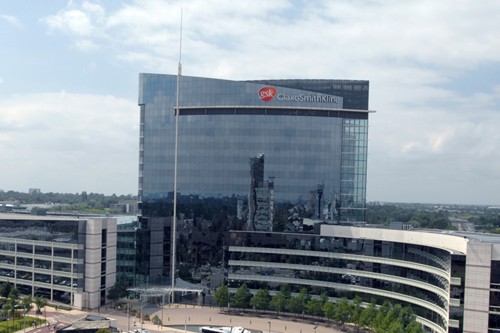
GlaxoSmithKline is celebrating an expanded US approval for its triple respiratory drug Trelegy, which it has long held up as one of its most important new product launches.
The new US label means Trelegy Ellipta (fluticasone furoate/umeclidinium/vilanterol) can be used in a broader population of chronic obstructive pulmonary disease (COPD) patients with difficulty breathing or who see their symptoms suddenly worsen, said GSK.
Specifically, the new approval is for the long-term, once-daily, maintenance treatment of airflow obstruction in patients with COPD, including chronic bronchitis and/or emphysema, which could make Trelegy a treatment option for more than seven million people in the US, up from less than a million at present. It is also under regulatory review in Europe for this indication.
The FDA green light comes on the back of the IMPACT trial which showed Trelegy could reduce exacerbations and other endpoints such as hospitalisations compared to two-drug COPD combinations.
Trelegy is at the heart of GSK’s plans to revive sales of its key respiratory franchise, which has been hit hard in the last couple of years by the loss of patent protection for COPD blockbuster Seretide/Advair (fluticasone propionate/salmeterol), even though competition in the US has been delayed by stringent FDA requirements for low-cost generics that have delayed copycat versions from Mylan, Hikma and Novartis.
The new product is still very much in its roll-out phase after getting FDA approval in September 2017 but, according to GSK, is off to a “strong start” with £11m ($15m) in sales in the first quarter of the year. Total respiratory franchise sales fell 6% to £1.58bn however, once again dragged down by a 25% fall for Seretide to £566m.
GSK claims Trelegy has made the strongest start of any of GSK’s new Ellipta range of respiratory meds, which also includes Relvar/Breo (fluticasone furoate/vilanterol) and Anoro (vilanterol/umeclidinium bromide) that added £219m and £97m respectively in the quarter. It still has a long way to go however before it meets analysts’ expectations of sales of $1.5bn-plus.
GSK is hoping for a pull-through effect for its two-drug combinations, which are facing increasing competition from other duos for COPD from rivals Novartis, AstraZeneca and Boehringer Ingelheim. The idea is that with the triple available, patients and physicians will be more likely to select a GSK double to start treatment with, as this effectively means just adding one additional drug to an established treatment regimen.
Among GSK’s other critical growth products shingles vaccine Shingrix made £110m in the first quarter – stronger than expected – while its HIV portfolio grew 6% to £1.05bn, which some analysts said was below expectations. GSK’s total revenues were down 2% to £7.2bn.
On a conference call, GSK chief executive Emma Walmsley said the company had made good progress in the quarter with sales growth at constant exchange rates across its pharma, consumer health and vaccines businesses.
She reiterated that building the early-stage pipeline remains a priority, and said the recent buy-out deal with Novartis to bolster the consumer health division would “help improve future cash generation and support capital planning” for that effort.




